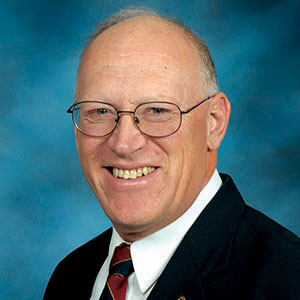Kansas Profile – Now That’s Rural: Dave Dreiling, Booth Creek Wagyu
May 18, 2022
Ron Wilson, director of the Huck Boyd National Institute for Rural Development at Kansas State University
Building better beef. That’s one goal of an innovative Kansas entrepreneur who is using a unique breed of cattle and careful quality control to create a remarkable beef-eating experience for consumers.
Dave Dreiling is the founder and owner of Booth Creek Wagyu. As we have previously profiled, Dave is a successful entrepreneur who studied business at K-State. He met and married Kristen Spaeth. Dave founded GTM, the sportswear company, and also owns numerous restaurants.
![]() In 2008, he bought a Pottawatomie County ranch, primarily for deer hunting. Through the years, he expanded the property, now known as Booth Creek Ranch. Meanwhile, Dareiling’s uncle raised greyhounds near Abilene and had started raising beef cattle as well, including some cows that had been bred to a bull from a Japanese breed known as Wagyu.
In 2008, he bought a Pottawatomie County ranch, primarily for deer hunting. Through the years, he expanded the property, now known as Booth Creek Ranch. Meanwhile, Dareiling’s uncle raised greyhounds near Abilene and had started raising beef cattle as well, including some cows that had been bred to a bull from a Japanese breed known as Wagyu.
At right: Dave Dreiling
“We got some of this beef and fell in love with it,” Dreiling said. They found it to be especially tender and flavorful. Dreiling went to his uncle’s dispersal sale with the intention of buying one animal, but ended up purchasing four full-blood Wagyu and 28 Wagyu embryos. “My intent was to buy a few head to have great beef for family and friends,” he said.
The more Dreiling learned about Wagyu, the more he became convinced about the potential of the breed and the opportunities to upgrade beef consumption. “There aren’t a lot of Wagyu producers,” he said. “One was a cattle company in California that was shipping them to Kansas to be fed, and then shipping them back to be processed.”
“Kansas is a better place to raise cattle,” Dreiling said. “Why couldn’t we do this here, all the way through?”
So Booth Creek Wagyu became the basis for a vertically integrated beef production operation, from the genetics and production all the way to processing, sales, and distribution. This would assure quality control through the entire process.
They purchased a meat processing business, now known as MeatWorks, in Riley. In March 2022, they opened a Booth Creek Wagyu retail store and sampling kitchen in east Manhattan.
What makes Wagyu beef exceptional? “It’s all about the marbling, which contributes to taste and tenderness,” Dreiling said. “Then I stumbled on the health benefits. Most of the fat is unsaturated. Wagyu beef is higher in Omega 3s and 6s than salmon and is lower in cholesterol than chicken.”
“I’ve heard our store described as a jewelry store for beef because we offer lots of choices,” Dreiling said.
Booth Creek Wagyu sells beef cuts at the Silver, Gold, and Platinum levels, with the higher levels featuring higher amounts of marbling. USDA Prime beef is 8-12% IMF, while a Platinum full-blood Wagyu is 26% IMF or more. “That makes a rich steak so people might not eat as much of it,” Dreiling said.
“Wagyu is like coffee these days – people have lots of different preferences. Some want dark roast, some want it lighter, and no one is wrong. Some (beef consumers) prefer more tenderness and some want less fat.”
He’s devised a camera system that takes an electronic image of each cut of meat, and the image is transmitted to Japan for grading. “We know where every steak comes from and how it grades,” Dreiling said.
The Booth Creek Wagyu store includes a sampling kitchen so people can decide what level of marbling they prefer. “We want to help people dial in on what kind of beef they like,” Dreiling said.
His intent is to build on the Manhattan store and open additional Wagyu stores and sampling kitchens across the region and the nation.
All of the store’s Wagyu beef originates at Booth Creek Ranch, located near the rural community of Olsburg, population 219 people. Now, that’s rural.
For more information, go to www.boothcreekwagyu.com.
Can beef be better? That’s become a passion for this Kansas entrepreneur. We commend Dave Dreiling and all those involved with Booth Creek Wagyu for making a difference with innovative production and marketing. We’re glad he’s making a business of building better beef.
Audio and text files of Kansas Profiles are available at http://www.kansasprofile.com. For more information about the Huck Boyd Institute, interested persons can visit http://www.huckboydinstitute.org.
***
The mission of the Huck Boyd National Institute for Rural Development is to enhance rural development by helping rural people help themselves. The Kansas Profile radio series and columns are produced with assistance from the K-State Research and Extension Department of Communications News Media Services unit. A photo of Ron Wilson is available at http://www.ksre.ksu.edu/news/sty/RonWilson.htm. Audio and text files of Kansas Profiles are available at http://www.kansasprofile.com. For more information about the Huck Boyd Institute, interested persons can visit http://www.huckboydinstitute.org.


